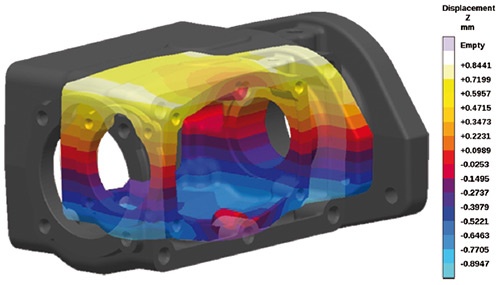Improved Casting Design Helps Both Customer and Supplier
Bremen Castings, Inc. (BCI) is known worldwide for its quality gray and ductile iron machined castings. Casting process simulation at BCI is not only used to optimize casting processes but also to communicate root causes of a defect issue to a customer and to propose design changes to eliminate them.
Foundries commonly quote 200 or more castings per month. This is after they eliminate unfeasible parts. Of the quoted parts, usually 1-2% will eventually be awarded to the foundry. It is unfortunate, but practically unavoidable, that a foundry eventually ends up with some castings that several other foundries have failed to make. Nearly always when this happens, the casting design is at fault and leads to casting defects that cannot be eliminated by any casting process adjustments or only at unreasonably high costs. Casting buyers usually do not volunteer information about this history when they send requests for quotes to yet another foundry. Many foundries quickly “give up” in such cases and cancel the contract, even if this will incur penalties.
Bremen Castings has taken a different approach: in the case described here, it ran the part through MAGMASOFT®, evaluating if cracks showing up in 8% of the castings were caused by the casting process and could be eliminated by changing it. A complete filling, solidification, and stress simulation during the solidification and cooling process revealed that the casting process itself was not at fault. The design of the casting lead to very high stresses not only in sharp corners, but also on surfaces that were bent by distortion during the solidification and cooling process. The simulation results clearly showed how the casting distorts, eventually leading to stresses and strains that exceed the strength of the material at the temperature level at that time.
Through three iterations, the casting design was modified to develop a robust design, which reduced the overall distortion and avoided the bending of surfaces, as well as avoided stress peaks in corners (which were rounded). It is interesting to see that the final design looks much more like an airplane window, a design commonly known for avoiding peak stresses.
MAGMA’s casting process simulation results were used to clearly communicate the design issues to the customer’s designers. MAGMASOFT® became the “neutral assessor” of a defect issue, avoiding blame and arguments about who is right or wrong and focusing the discussion on facts and physics. The optimization of a design in the virtual world allowed for testing several approaches to resolve the issues, leading to a final, cost effective way to develop a design that can work for both – customer and supplier.
Founded in 1939 as a family owned and operated foundry, Bremen Castings, Inc. (BCI) is now in its 4th generation. With over 70 years of experience, the company continually reinvests in new equipment for production, environmental, and automation improvements. In 1996 BCI launched its own internal machine shop with the expectation to diversify across many markets, forcing quality and engineering to become more diverse in both machining and the foundry. This gives BCI the advantage that both departments communicate before product launches, resulting in lower costs. BCI now has over 13 CNC machines in its arsenal. Keeping up with technology is high on the priority list to maintain its worldwide reputation as a foundry for quality gray and ductile iron machined castings. The purchase of their two MAGMASOFT® licenses in 2005 was quickly followed by the addition of the optimization module, enabling BCI to use autonomous optimization to optimize casting designs and processes.


